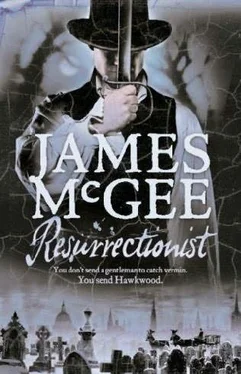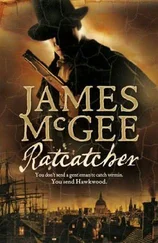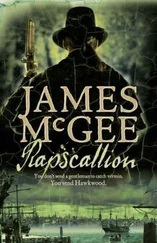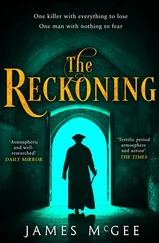James McGee - Resurrectionist
Здесь есть возможность читать онлайн «James McGee - Resurrectionist» — ознакомительный отрывок электронной книги совершенно бесплатно, а после прочтения отрывка купить полную версию. В некоторых случаях можно слушать аудио, скачать через торрент в формате fb2 и присутствует краткое содержание. Жанр: Исторический детектив, на английском языке. Описание произведения, (предисловие) а так же отзывы посетителей доступны на портале библиотеки ЛибКат.
- Название:Resurrectionist
- Автор:
- Жанр:
- Год:неизвестен
- ISBN:нет данных
- Рейтинг книги:4 / 5. Голосов: 1
-
Избранное:Добавить в избранное
- Отзывы:
-
Ваша оценка:
- 80
- 1
- 2
- 3
- 4
- 5
Resurrectionist: краткое содержание, описание и аннотация
Предлагаем к чтению аннотацию, описание, краткое содержание или предисловие (зависит от того, что написал сам автор книги «Resurrectionist»). Если вы не нашли необходимую информацию о книге — напишите в комментариях, мы постараемся отыскать её.
Resurrectionist — читать онлайн ознакомительный отрывок
Ниже представлен текст книги, разбитый по страницам. Система сохранения места последней прочитанной страницы, позволяет с удобством читать онлайн бесплатно книгу «Resurrectionist», без необходимости каждый раз заново искать на чём Вы остановились. Поставьте закладку, и сможете в любой момент перейти на страницу, на которой закончили чтение.
Интервал:
Закладка:
“Yes.”
“And saw many of your comrades die?”
“Too many,” Hawkwood said truthfully.
“So you know the nature of war, the horror of it.” It was a statement not a question.
Hawkwood thought of the times he’d woken in the dead of night, drenched in sweat, with the smell of death in his nostrils and the screams of men and the crash of cannon fire ringing in his ears; sounds so real he’d thought he had been transported back in time to the blood and the mud and the flames.
War wasn’t glorious, despite the pageantry, the colourful uniforms, and the fifes and drums. War was, without exception, nothing short of hell on earth. There were moments of extraordinary bravery and heady triumph, as sweet as honey on the tongue, but mostly there was fear; massive, gut-wrenching, knee-jerking fear. Fear of being killed, fear of being wounded or crippled, fear of being thought a craven coward by your comrades, fear of dying alone on some bleak, godforsaken foreign hillside with no one back home to mourn your passing. That was the real horror. That was the truth of it.
He hadn’t had the dreams for a while, but that didn’t mean they weren’t there, waiting to emerge unbidden, like demons in the darkness.
“I apologize,” Locke said. The eyes behind his spectacles glinted perceptively. “It was not my intention to stir up unpleasant memories. In answer to your question, Colonel Hyde was admitted to the hospital a little over two years ago. According to Dr Monro, the colonel’s admission was due not to mania, as you might suppose, but an acute state of melancholy.”
“Melancholy?”
“Correct. You saw the carvings above the entrance, I take it?”
Hawkwood recalled the naked stone figures and nodded.
“They are known as Raving and Melancholy Madness. I’m sure you can guess which was which.”
Hawkwood said nothing. He was remembering the manacles and the silent scream.
Locke went on, “There was a time when diagnosis was considered that simple. If the patient was not obviously suffering from one, he or she was inevitably a victim of the other. It is not, however, as you may have surmised from my discourse, as simple as that. Melancholy comes in many forms. Take the unfortunates contained within these walls, for example. For every ten patients suffering the effects of drink and intoxication, I could show you twenty who suffer from excessive jealousy. For every fifteen stricken by religion and Methodism, I can list thirty whose minds have been addled by syphilis or smallpox. Pride, fright, fever, even love; the causes of insanity — melancholy in particular — are numerous, Officer Hawkwood. But by far the most common are misfortune, trouble, disappointment and grief.”
“You’re trying to tell me that the colonel was disappointed about something?” Hawkwood said. “Hell’s teeth, if he removed a man’s face because he was disappointed, what the devil’s he going to do when he’s angry?”
The apothecary ignored Hawkwood’s retort, but continued in the same calm manner. “My understanding is that it was the commissioners’ judgement that the colonel’s experiences working amongst the wounded and the dying precipitated a state of chaos within his brain. It was as if his attempts to mend the broken bodies of his patients had a debilitating effect on his own sanity; a terrible price to pay for years of dedicated service. I can only imagine the horrors that he witnessed, trying to make whole the shattered bodies of men, but there’s little doubt Colonel Hyde arrived here in a state of severe distraction.”
Locke pursed his lips, and then continued.
“As with all patients, he was reassessed after twelve months. I was not involved in the colonel’s case, you understand, it was before my time. Regrettably, it was the commissioners’ collective opinion that the colonel was incurable. The usual procedure is that incurables are discharged unless their family or friends are unable to provide care. He has no living family. There was a child that died, a daughter, though he did not talk about her. So, grief, too, has undoubtedly played a significant role in his state of mind. Fortunately, it appears he had friends who were willing to stand surety for him, on condition that he remained in our charge. It was at that juncture that he was transferred to our incurable department.”
“Was he ever restrained?”
Locke looked nonplussed. “Restrained?”
“Like Norris.”
“Ah, yes, Norris. You saw him?”
“Briefly,” Hawkwood said.
An expression of sympathy moved across the apothecary’s face. “He’s an American, a seaman. Came to us almost twelve years ago. He’s attacked his keepers on at least two occasions.” Locke gave a wan smile. “But I assure you, he is an exception. The vast majority of our incurables are perfectly harmless. You may even have heard of a couple of them. There’s Metcalfe, for example, who thinks he’s the heir to the throne of Denmark; the Nicholson woman; and Matthews, of course.”
Clearly the apothecary was expecting Hawkwood to recognize the names. He didn’t. He took a stab at one.
“Matthews?”
“Possibly a little before your time. He was the one who accused Lord Hawkesbury of treason on the floor of the House of Commons. In his defence, he told the court that an influencing device controlled by French Revolutionaries was manipulating his mind. The Air Loom, he called it. Fascinating case. He’s still here. In fact, believe it or not, he actually submitted plans for the new hospital. His talent for architectural drawing is considerable and yet he’s a tea planter by trade. Who’d have thought it? He’s undoubtedly one of our more… interesting patients. There are many others I could tell you about.”
The apothecary smiled again. “There are those who would tell you the colonel was in good company. But restrained, you ask? No, he was not shackled, despite the irons on the wall.”
“And yet he had his own quarters, separate from the others. Isn’t that unusual?”
Locke shrugged. “Not especially. A number of patients have their own rooms. Certainly, those with a tendency towards violence, like Norris, must remain segregated at all times, and chained. There are others, however, who, through good behaviour, have been granted the privilege of privacy. Matthews is one example. And there are those whose comfort is maintained by the generosity of their friends and family.”
“And the colonel?” Hawkwood prompted.
“Up until now, he was considered to be one of our most obedient patients.”
“You make him sound like some sort of lap dog.”
Locke smiled thinly. “Sickness is a strange beast, Officer Hawkwood, and none is stranger than sickness of the mind. There are those patients who thrive on the companionship of others and there are those who shrink from human contact. In either case, the patient’s welfare can also be affected by the circumstances of his or her confinement.” Locke raised an eyebrow. “You look at me as if I were mad. I assure you the theory is nothing new.
“Colonel Hyde is no drooling imbecile. He’s a well-born, educated man, a former army officer, and a surgeon to boot. He is not some prancing fool in a cap and bells. Indeed, I’d put it to you that, had you met and talked with him about the general turn of things, there’s every possibility you’d have considered him to be as sane as
you or I.”
“Does he know he’s mad?”
Locke sat back in his chair. He was silent for several seconds before voicing his reply.
“You pose an interesting question. There are doctors who consider madness to be a sickness of the soul, a spiritual malaise. My own theory is that madness is in fact a physical disease, an organic disorder of the brain, which manifests itself in an incorrect association of familiar ideas, ideas that are always accompanied by implicit belief. In my view, the reason people see objects and hear sounds that aren’t there is not because their sight or hearing is deficient, it is because their brains are not functioning properly. Nor is their intelligence necessarily at fault. On the contrary, they will frequently reason correctly, albeit from a false premise. In their own minds they are being perfectly rational. And so it is with Colonel Hyde. He is perfectly lucid and articulate. He does not think of himself as either sane or insane. One could argue that is the nature of his delusion.”
Читать дальшеИнтервал:
Закладка:
Похожие книги на «Resurrectionist»
Представляем Вашему вниманию похожие книги на «Resurrectionist» списком для выбора. Мы отобрали схожую по названию и смыслу литературу в надежде предоставить читателям больше вариантов отыскать новые, интересные, ещё непрочитанные произведения.
Обсуждение, отзывы о книге «Resurrectionist» и просто собственные мнения читателей. Оставьте ваши комментарии, напишите, что Вы думаете о произведении, его смысле или главных героях. Укажите что конкретно понравилось, а что нет, и почему Вы так считаете.












